Entrepreneurial Ventures, Skills, and Economic Impact Report
VerifiedAdded on 2021/01/01
|13
|3885
|252
Report
AI Summary
This report delves into the multifaceted world of entrepreneurship and small business management. It begins by outlining different types of entrepreneurial ventures, including small businesses, lifestyle businesses, large businesses, and scalable startups, while also highlighting their similarities and differences. The report then explores the significant impact of small and micro businesses on the economy, including their contribution to job creation, tax revenue, and GDP growth. Furthermore, it emphasizes the importance of startups in fostering innovation, attracting investment, and improving the standard of living. The report also analyzes the essential traits and skills of successful entrepreneurs, such as leadership, adaptability, and risk-taking, and examines the influence of an entrepreneur's background and experience on their entrepreneurial journey. The report concludes by summarizing the key findings and providing a comprehensive overview of the entrepreneurial landscape.

Entrepreneurship and small
business management
business management
Paraphrase This Document
Need a fresh take? Get an instant paraphrase of this document with our AI Paraphraser
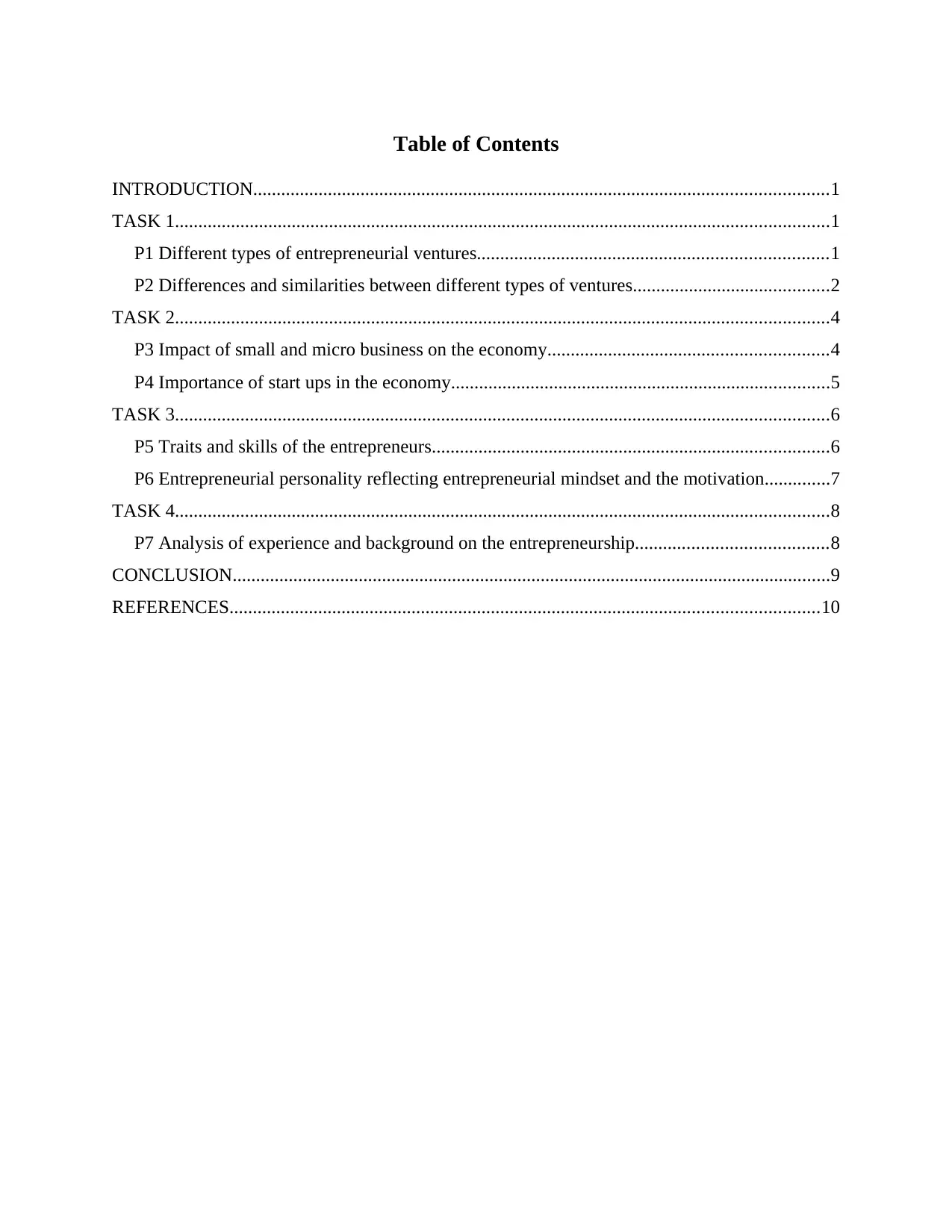
Table of Contents
INTRODUCTION...........................................................................................................................1
TASK 1............................................................................................................................................1
P1 Different types of entrepreneurial ventures...........................................................................1
P2 Differences and similarities between different types of ventures..........................................2
TASK 2............................................................................................................................................4
P3 Impact of small and micro business on the economy............................................................4
P4 Importance of start ups in the economy.................................................................................5
TASK 3............................................................................................................................................6
P5 Traits and skills of the entrepreneurs.....................................................................................6
P6 Entrepreneurial personality reflecting entrepreneurial mindset and the motivation..............7
TASK 4............................................................................................................................................8
P7 Analysis of experience and background on the entrepreneurship.........................................8
CONCLUSION................................................................................................................................9
REFERENCES..............................................................................................................................10
INTRODUCTION...........................................................................................................................1
TASK 1............................................................................................................................................1
P1 Different types of entrepreneurial ventures...........................................................................1
P2 Differences and similarities between different types of ventures..........................................2
TASK 2............................................................................................................................................4
P3 Impact of small and micro business on the economy............................................................4
P4 Importance of start ups in the economy.................................................................................5
TASK 3............................................................................................................................................6
P5 Traits and skills of the entrepreneurs.....................................................................................6
P6 Entrepreneurial personality reflecting entrepreneurial mindset and the motivation..............7
TASK 4............................................................................................................................................8
P7 Analysis of experience and background on the entrepreneurship.........................................8
CONCLUSION................................................................................................................................9
REFERENCES..............................................................................................................................10

⊘ This is a preview!⊘
Do you want full access?
Subscribe today to unlock all pages.

Trusted by 1+ million students worldwide
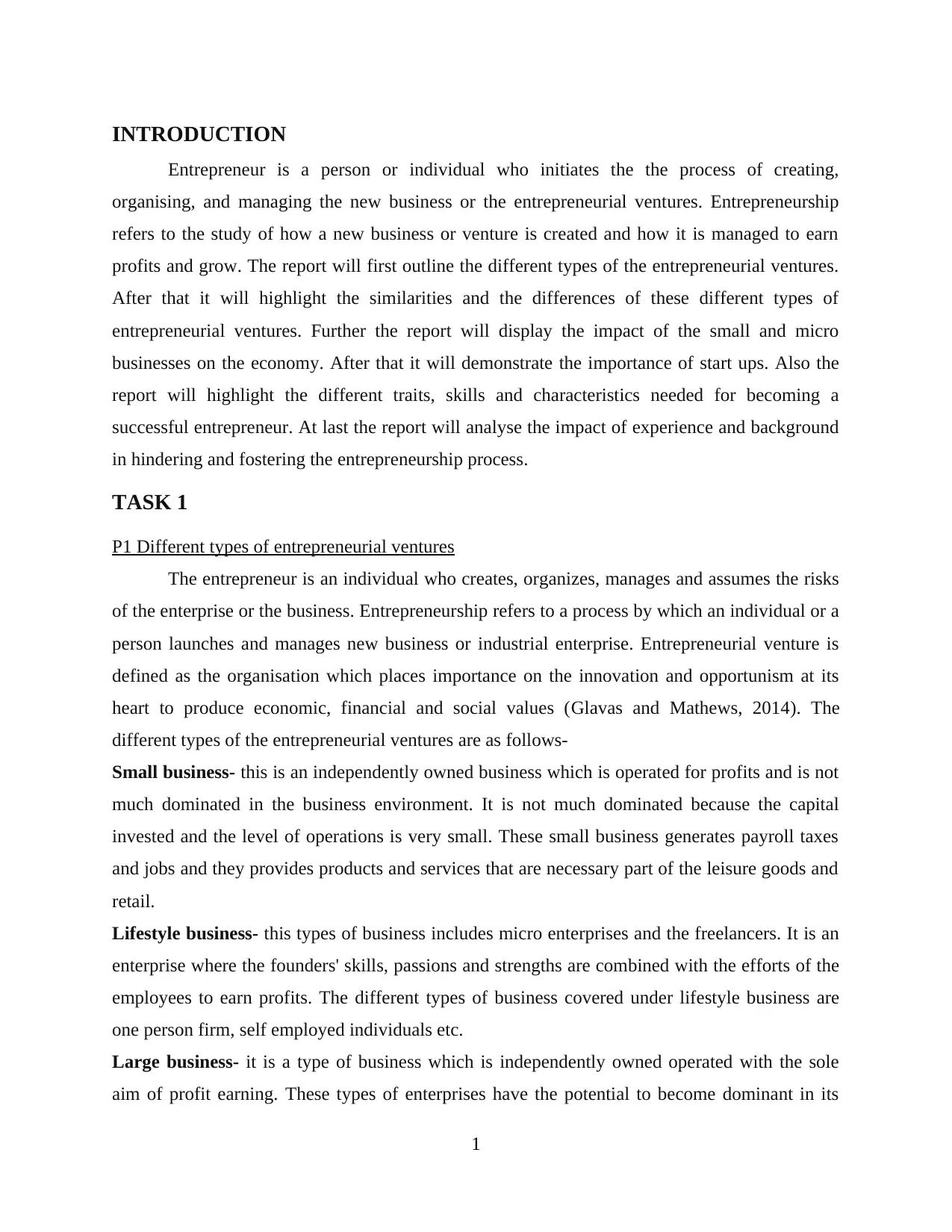
INTRODUCTION
Entrepreneur is a person or individual who initiates the the process of creating,
organising, and managing the new business or the entrepreneurial ventures. Entrepreneurship
refers to the study of how a new business or venture is created and how it is managed to earn
profits and grow. The report will first outline the different types of the entrepreneurial ventures.
After that it will highlight the similarities and the differences of these different types of
entrepreneurial ventures. Further the report will display the impact of the small and micro
businesses on the economy. After that it will demonstrate the importance of start ups. Also the
report will highlight the different traits, skills and characteristics needed for becoming a
successful entrepreneur. At last the report will analyse the impact of experience and background
in hindering and fostering the entrepreneurship process.
TASK 1
P1 Different types of entrepreneurial ventures
The entrepreneur is an individual who creates, organizes, manages and assumes the risks
of the enterprise or the business. Entrepreneurship refers to a process by which an individual or a
person launches and manages new business or industrial enterprise. Entrepreneurial venture is
defined as the organisation which places importance on the innovation and opportunism at its
heart to produce economic, financial and social values (Glavas and Mathews, 2014). The
different types of the entrepreneurial ventures are as follows-
Small business- this is an independently owned business which is operated for profits and is not
much dominated in the business environment. It is not much dominated because the capital
invested and the level of operations is very small. These small business generates payroll taxes
and jobs and they provides products and services that are necessary part of the leisure goods and
retail.
Lifestyle business- this types of business includes micro enterprises and the freelancers. It is an
enterprise where the founders' skills, passions and strengths are combined with the efforts of the
employees to earn profits. The different types of business covered under lifestyle business are
one person firm, self employed individuals etc.
Large business- it is a type of business which is independently owned operated with the sole
aim of profit earning. These types of enterprises have the potential to become dominant in its
1
Entrepreneur is a person or individual who initiates the the process of creating,
organising, and managing the new business or the entrepreneurial ventures. Entrepreneurship
refers to the study of how a new business or venture is created and how it is managed to earn
profits and grow. The report will first outline the different types of the entrepreneurial ventures.
After that it will highlight the similarities and the differences of these different types of
entrepreneurial ventures. Further the report will display the impact of the small and micro
businesses on the economy. After that it will demonstrate the importance of start ups. Also the
report will highlight the different traits, skills and characteristics needed for becoming a
successful entrepreneur. At last the report will analyse the impact of experience and background
in hindering and fostering the entrepreneurship process.
TASK 1
P1 Different types of entrepreneurial ventures
The entrepreneur is an individual who creates, organizes, manages and assumes the risks
of the enterprise or the business. Entrepreneurship refers to a process by which an individual or a
person launches and manages new business or industrial enterprise. Entrepreneurial venture is
defined as the organisation which places importance on the innovation and opportunism at its
heart to produce economic, financial and social values (Glavas and Mathews, 2014). The
different types of the entrepreneurial ventures are as follows-
Small business- this is an independently owned business which is operated for profits and is not
much dominated in the business environment. It is not much dominated because the capital
invested and the level of operations is very small. These small business generates payroll taxes
and jobs and they provides products and services that are necessary part of the leisure goods and
retail.
Lifestyle business- this types of business includes micro enterprises and the freelancers. It is an
enterprise where the founders' skills, passions and strengths are combined with the efforts of the
employees to earn profits. The different types of business covered under lifestyle business are
one person firm, self employed individuals etc.
Large business- it is a type of business which is independently owned operated with the sole
aim of profit earning. These types of enterprises have the potential to become dominant in its
1
Paraphrase This Document
Need a fresh take? Get an instant paraphrase of this document with our AI Paraphraser
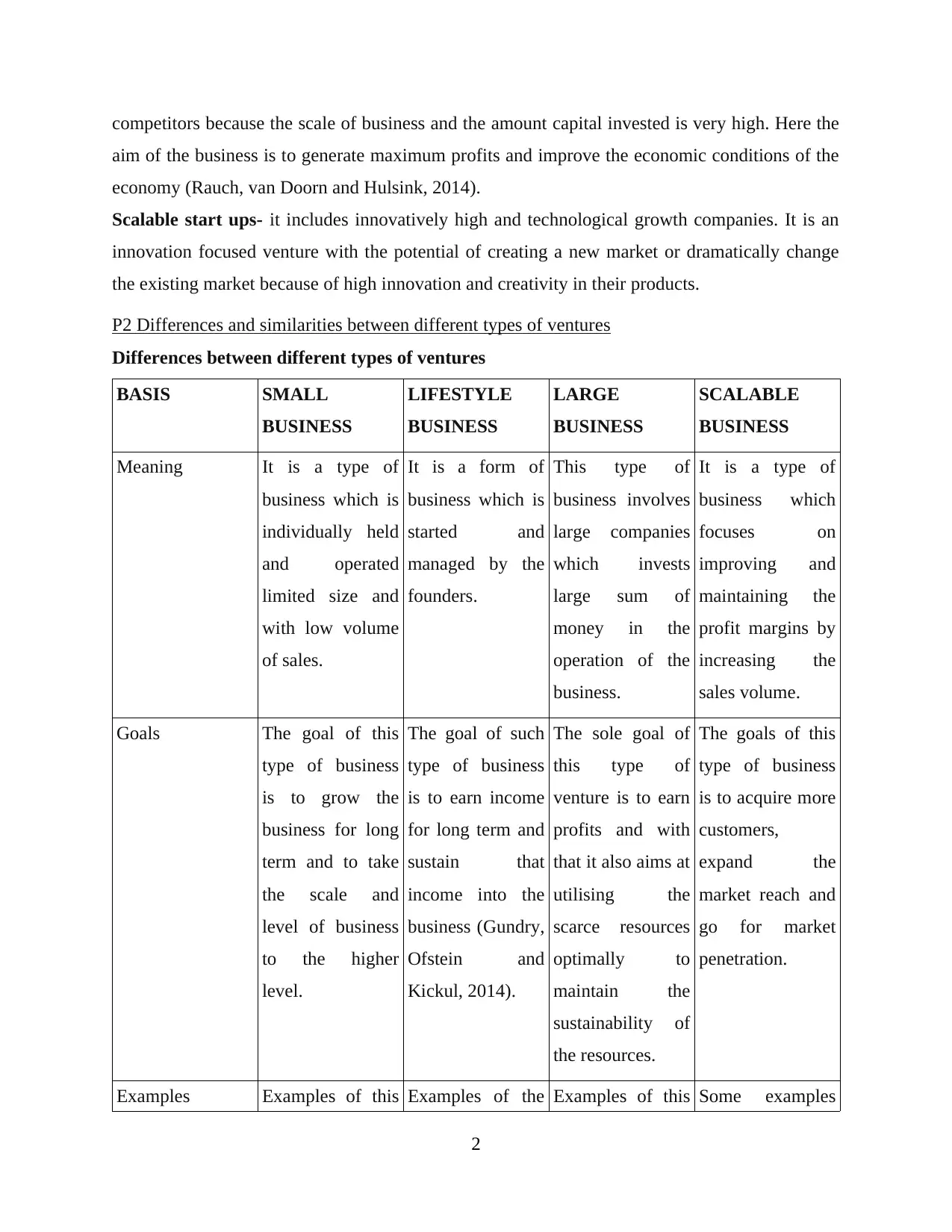
competitors because the scale of business and the amount capital invested is very high. Here the
aim of the business is to generate maximum profits and improve the economic conditions of the
economy (Rauch, van Doorn and Hulsink, 2014).
Scalable start ups- it includes innovatively high and technological growth companies. It is an
innovation focused venture with the potential of creating a new market or dramatically change
the existing market because of high innovation and creativity in their products.
P2 Differences and similarities between different types of ventures
Differences between different types of ventures
BASIS SMALL
BUSINESS
LIFESTYLE
BUSINESS
LARGE
BUSINESS
SCALABLE
BUSINESS
Meaning It is a type of
business which is
individually held
and operated
limited size and
with low volume
of sales.
It is a form of
business which is
started and
managed by the
founders.
This type of
business involves
large companies
which invests
large sum of
money in the
operation of the
business.
It is a type of
business which
focuses on
improving and
maintaining the
profit margins by
increasing the
sales volume.
Goals The goal of this
type of business
is to grow the
business for long
term and to take
the scale and
level of business
to the higher
level.
The goal of such
type of business
is to earn income
for long term and
sustain that
income into the
business (Gundry,
Ofstein and
Kickul, 2014).
The sole goal of
this type of
venture is to earn
profits and with
that it also aims at
utilising the
scarce resources
optimally to
maintain the
sustainability of
the resources.
The goals of this
type of business
is to acquire more
customers,
expand the
market reach and
go for market
penetration.
Examples Examples of this Examples of the Examples of this Some examples
2
aim of the business is to generate maximum profits and improve the economic conditions of the
economy (Rauch, van Doorn and Hulsink, 2014).
Scalable start ups- it includes innovatively high and technological growth companies. It is an
innovation focused venture with the potential of creating a new market or dramatically change
the existing market because of high innovation and creativity in their products.
P2 Differences and similarities between different types of ventures
Differences between different types of ventures
BASIS SMALL
BUSINESS
LIFESTYLE
BUSINESS
LARGE
BUSINESS
SCALABLE
BUSINESS
Meaning It is a type of
business which is
individually held
and operated
limited size and
with low volume
of sales.
It is a form of
business which is
started and
managed by the
founders.
This type of
business involves
large companies
which invests
large sum of
money in the
operation of the
business.
It is a type of
business which
focuses on
improving and
maintaining the
profit margins by
increasing the
sales volume.
Goals The goal of this
type of business
is to grow the
business for long
term and to take
the scale and
level of business
to the higher
level.
The goal of such
type of business
is to earn income
for long term and
sustain that
income into the
business (Gundry,
Ofstein and
Kickul, 2014).
The sole goal of
this type of
venture is to earn
profits and with
that it also aims at
utilising the
scarce resources
optimally to
maintain the
sustainability of
the resources.
The goals of this
type of business
is to acquire more
customers,
expand the
market reach and
go for market
penetration.
Examples Examples of this Examples of the Examples of this Some examples
2
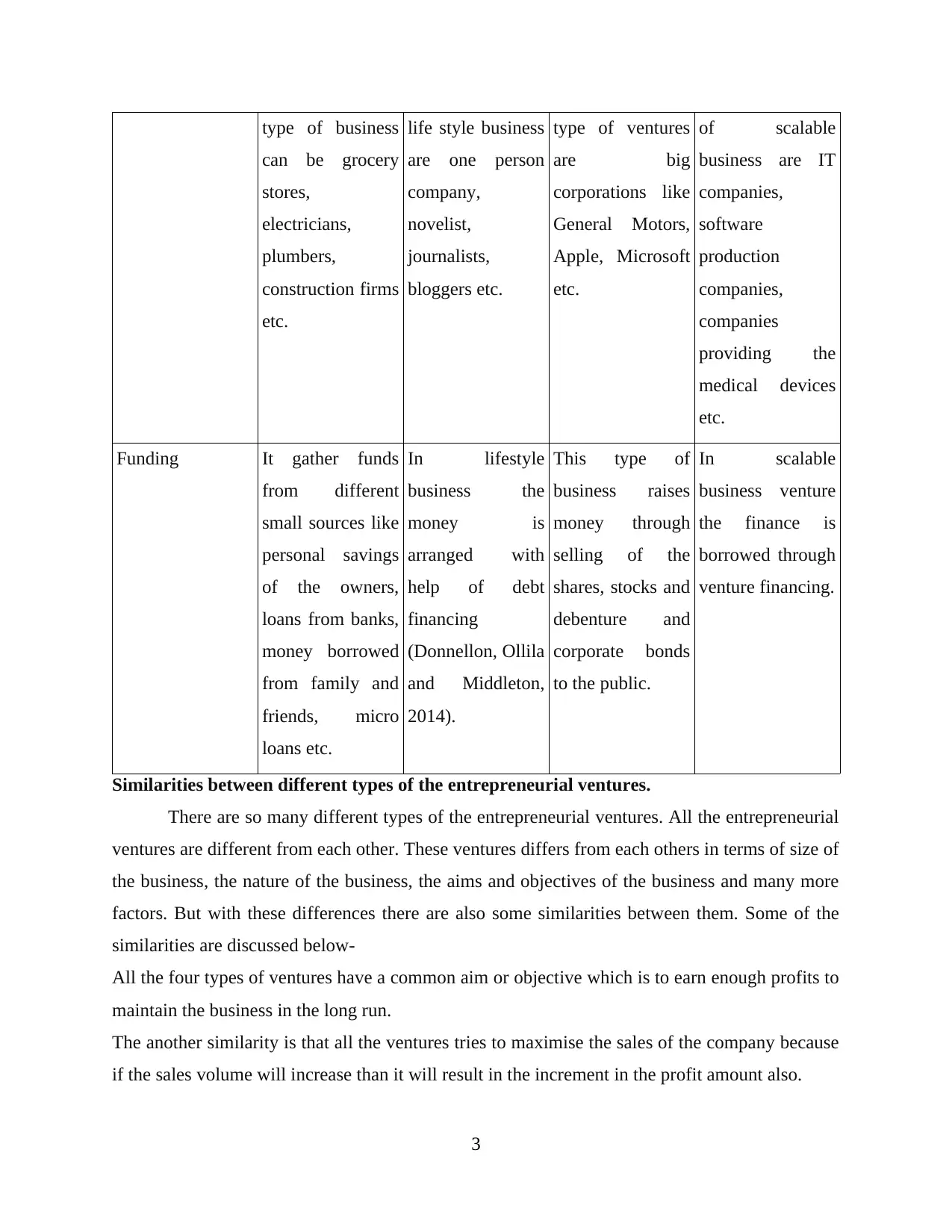
type of business
can be grocery
stores,
electricians,
plumbers,
construction firms
etc.
life style business
are one person
company,
novelist,
journalists,
bloggers etc.
type of ventures
are big
corporations like
General Motors,
Apple, Microsoft
etc.
of scalable
business are IT
companies,
software
production
companies,
companies
providing the
medical devices
etc.
Funding It gather funds
from different
small sources like
personal savings
of the owners,
loans from banks,
money borrowed
from family and
friends, micro
loans etc.
In lifestyle
business the
money is
arranged with
help of debt
financing
(Donnellon, Ollila
and Middleton,
2014).
This type of
business raises
money through
selling of the
shares, stocks and
debenture and
corporate bonds
to the public.
In scalable
business venture
the finance is
borrowed through
venture financing.
Similarities between different types of the entrepreneurial ventures.
There are so many different types of the entrepreneurial ventures. All the entrepreneurial
ventures are different from each other. These ventures differs from each others in terms of size of
the business, the nature of the business, the aims and objectives of the business and many more
factors. But with these differences there are also some similarities between them. Some of the
similarities are discussed below-
All the four types of ventures have a common aim or objective which is to earn enough profits to
maintain the business in the long run.
The another similarity is that all the ventures tries to maximise the sales of the company because
if the sales volume will increase than it will result in the increment in the profit amount also.
3
can be grocery
stores,
electricians,
plumbers,
construction firms
etc.
life style business
are one person
company,
novelist,
journalists,
bloggers etc.
type of ventures
are big
corporations like
General Motors,
Apple, Microsoft
etc.
of scalable
business are IT
companies,
software
production
companies,
companies
providing the
medical devices
etc.
Funding It gather funds
from different
small sources like
personal savings
of the owners,
loans from banks,
money borrowed
from family and
friends, micro
loans etc.
In lifestyle
business the
money is
arranged with
help of debt
financing
(Donnellon, Ollila
and Middleton,
2014).
This type of
business raises
money through
selling of the
shares, stocks and
debenture and
corporate bonds
to the public.
In scalable
business venture
the finance is
borrowed through
venture financing.
Similarities between different types of the entrepreneurial ventures.
There are so many different types of the entrepreneurial ventures. All the entrepreneurial
ventures are different from each other. These ventures differs from each others in terms of size of
the business, the nature of the business, the aims and objectives of the business and many more
factors. But with these differences there are also some similarities between them. Some of the
similarities are discussed below-
All the four types of ventures have a common aim or objective which is to earn enough profits to
maintain the business in the long run.
The another similarity is that all the ventures tries to maximise the sales of the company because
if the sales volume will increase than it will result in the increment in the profit amount also.
3
⊘ This is a preview!⊘
Do you want full access?
Subscribe today to unlock all pages.

Trusted by 1+ million students worldwide
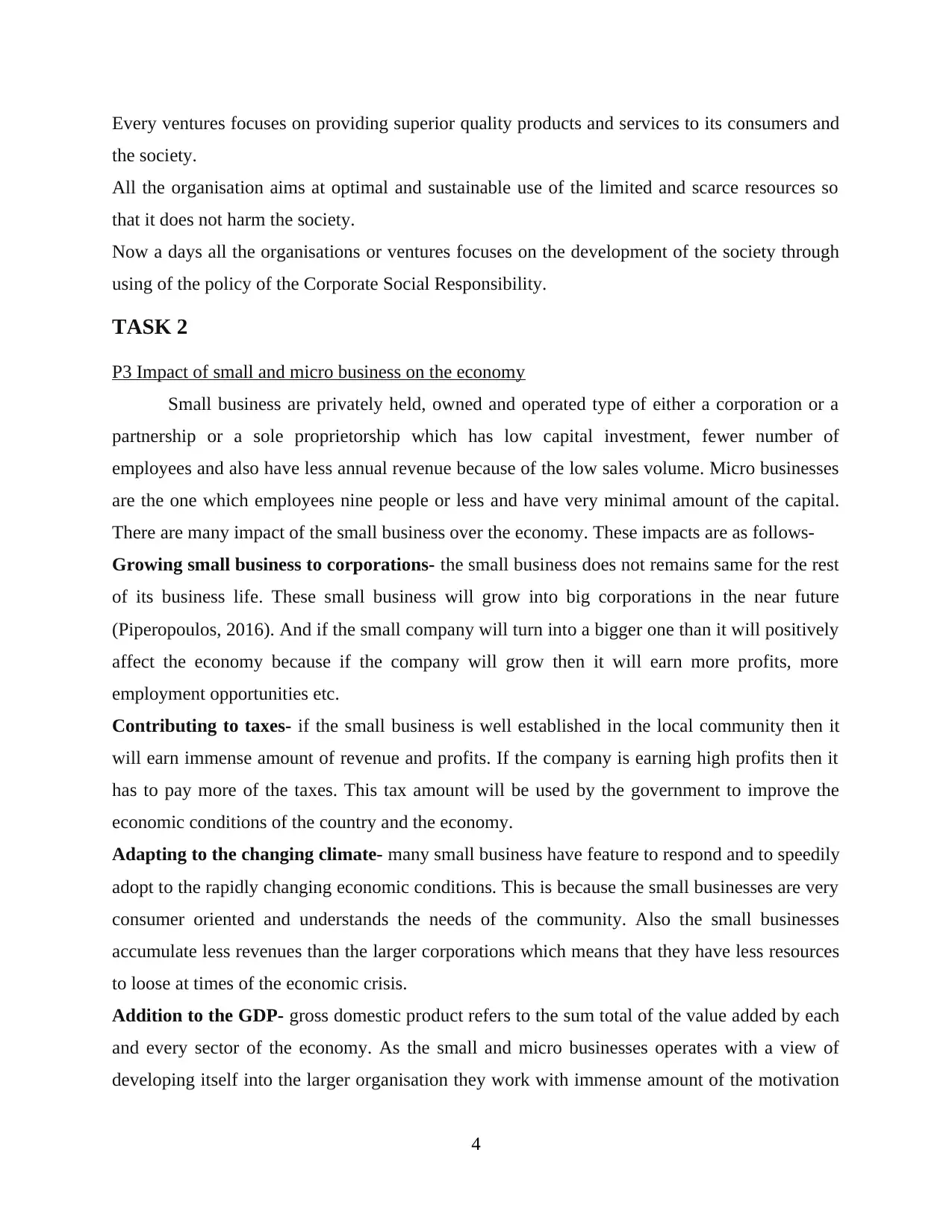
Every ventures focuses on providing superior quality products and services to its consumers and
the society.
All the organisation aims at optimal and sustainable use of the limited and scarce resources so
that it does not harm the society.
Now a days all the organisations or ventures focuses on the development of the society through
using of the policy of the Corporate Social Responsibility.
TASK 2
P3 Impact of small and micro business on the economy
Small business are privately held, owned and operated type of either a corporation or a
partnership or a sole proprietorship which has low capital investment, fewer number of
employees and also have less annual revenue because of the low sales volume. Micro businesses
are the one which employees nine people or less and have very minimal amount of the capital.
There are many impact of the small business over the economy. These impacts are as follows-
Growing small business to corporations- the small business does not remains same for the rest
of its business life. These small business will grow into big corporations in the near future
(Piperopoulos, 2016). And if the small company will turn into a bigger one than it will positively
affect the economy because if the company will grow then it will earn more profits, more
employment opportunities etc.
Contributing to taxes- if the small business is well established in the local community then it
will earn immense amount of revenue and profits. If the company is earning high profits then it
has to pay more of the taxes. This tax amount will be used by the government to improve the
economic conditions of the country and the economy.
Adapting to the changing climate- many small business have feature to respond and to speedily
adopt to the rapidly changing economic conditions. This is because the small businesses are very
consumer oriented and understands the needs of the community. Also the small businesses
accumulate less revenues than the larger corporations which means that they have less resources
to loose at times of the economic crisis.
Addition to the GDP- gross domestic product refers to the sum total of the value added by each
and every sector of the economy. As the small and micro businesses operates with a view of
developing itself into the larger organisation they work with immense amount of the motivation
4
the society.
All the organisation aims at optimal and sustainable use of the limited and scarce resources so
that it does not harm the society.
Now a days all the organisations or ventures focuses on the development of the society through
using of the policy of the Corporate Social Responsibility.
TASK 2
P3 Impact of small and micro business on the economy
Small business are privately held, owned and operated type of either a corporation or a
partnership or a sole proprietorship which has low capital investment, fewer number of
employees and also have less annual revenue because of the low sales volume. Micro businesses
are the one which employees nine people or less and have very minimal amount of the capital.
There are many impact of the small business over the economy. These impacts are as follows-
Growing small business to corporations- the small business does not remains same for the rest
of its business life. These small business will grow into big corporations in the near future
(Piperopoulos, 2016). And if the small company will turn into a bigger one than it will positively
affect the economy because if the company will grow then it will earn more profits, more
employment opportunities etc.
Contributing to taxes- if the small business is well established in the local community then it
will earn immense amount of revenue and profits. If the company is earning high profits then it
has to pay more of the taxes. This tax amount will be used by the government to improve the
economic conditions of the country and the economy.
Adapting to the changing climate- many small business have feature to respond and to speedily
adopt to the rapidly changing economic conditions. This is because the small businesses are very
consumer oriented and understands the needs of the community. Also the small businesses
accumulate less revenues than the larger corporations which means that they have less resources
to loose at times of the economic crisis.
Addition to the GDP- gross domestic product refers to the sum total of the value added by each
and every sector of the economy. As the small and micro businesses operates with a view of
developing itself into the larger organisation they work with immense amount of the motivation
4
Paraphrase This Document
Need a fresh take? Get an instant paraphrase of this document with our AI Paraphraser
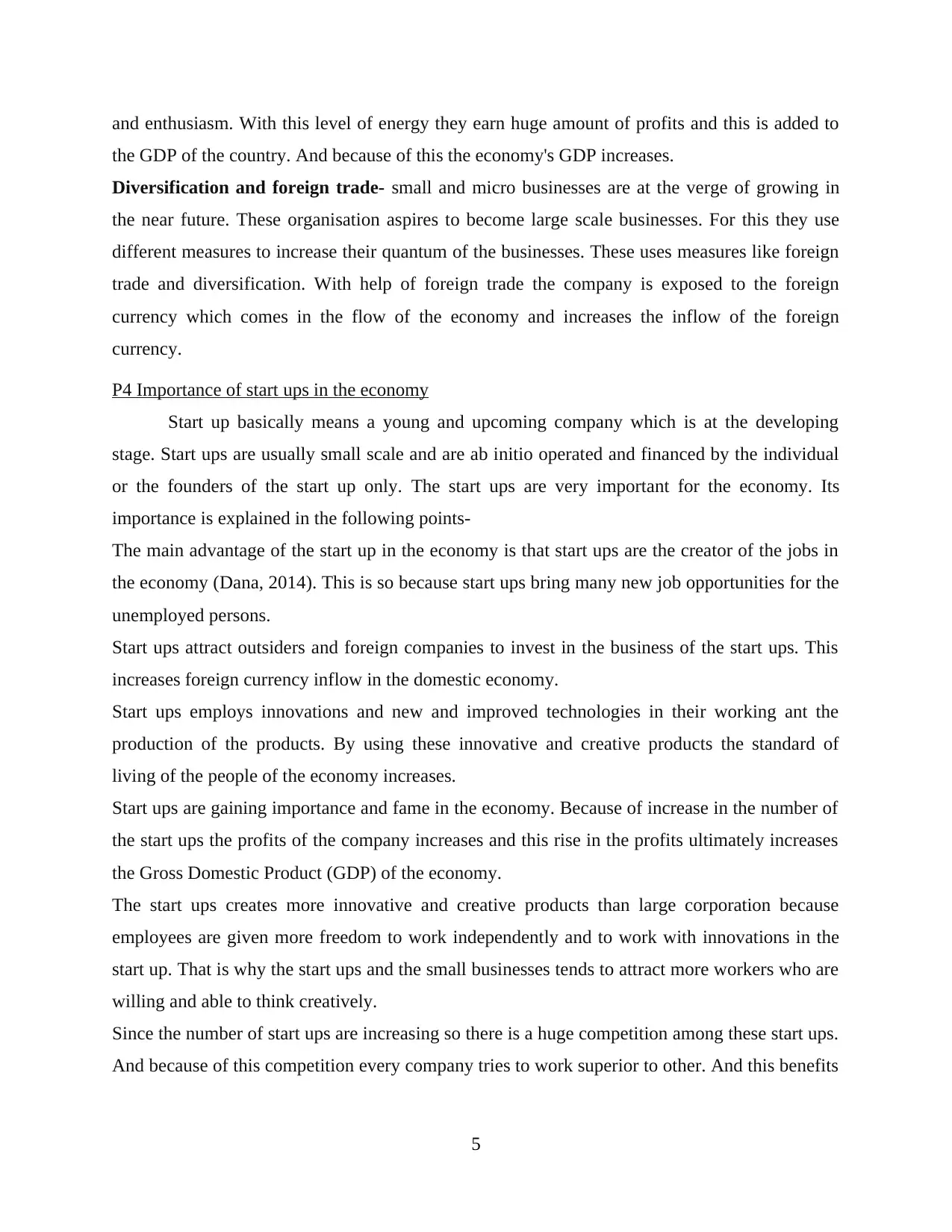
and enthusiasm. With this level of energy they earn huge amount of profits and this is added to
the GDP of the country. And because of this the economy's GDP increases.
Diversification and foreign trade- small and micro businesses are at the verge of growing in
the near future. These organisation aspires to become large scale businesses. For this they use
different measures to increase their quantum of the businesses. These uses measures like foreign
trade and diversification. With help of foreign trade the company is exposed to the foreign
currency which comes in the flow of the economy and increases the inflow of the foreign
currency.
P4 Importance of start ups in the economy
Start up basically means a young and upcoming company which is at the developing
stage. Start ups are usually small scale and are ab initio operated and financed by the individual
or the founders of the start up only. The start ups are very important for the economy. Its
importance is explained in the following points-
The main advantage of the start up in the economy is that start ups are the creator of the jobs in
the economy (Dana, 2014). This is so because start ups bring many new job opportunities for the
unemployed persons.
Start ups attract outsiders and foreign companies to invest in the business of the start ups. This
increases foreign currency inflow in the domestic economy.
Start ups employs innovations and new and improved technologies in their working ant the
production of the products. By using these innovative and creative products the standard of
living of the people of the economy increases.
Start ups are gaining importance and fame in the economy. Because of increase in the number of
the start ups the profits of the company increases and this rise in the profits ultimately increases
the Gross Domestic Product (GDP) of the economy.
The start ups creates more innovative and creative products than large corporation because
employees are given more freedom to work independently and to work with innovations in the
start up. That is why the start ups and the small businesses tends to attract more workers who are
willing and able to think creatively.
Since the number of start ups are increasing so there is a huge competition among these start ups.
And because of this competition every company tries to work superior to other. And this benefits
5
the GDP of the country. And because of this the economy's GDP increases.
Diversification and foreign trade- small and micro businesses are at the verge of growing in
the near future. These organisation aspires to become large scale businesses. For this they use
different measures to increase their quantum of the businesses. These uses measures like foreign
trade and diversification. With help of foreign trade the company is exposed to the foreign
currency which comes in the flow of the economy and increases the inflow of the foreign
currency.
P4 Importance of start ups in the economy
Start up basically means a young and upcoming company which is at the developing
stage. Start ups are usually small scale and are ab initio operated and financed by the individual
or the founders of the start up only. The start ups are very important for the economy. Its
importance is explained in the following points-
The main advantage of the start up in the economy is that start ups are the creator of the jobs in
the economy (Dana, 2014). This is so because start ups bring many new job opportunities for the
unemployed persons.
Start ups attract outsiders and foreign companies to invest in the business of the start ups. This
increases foreign currency inflow in the domestic economy.
Start ups employs innovations and new and improved technologies in their working ant the
production of the products. By using these innovative and creative products the standard of
living of the people of the economy increases.
Start ups are gaining importance and fame in the economy. Because of increase in the number of
the start ups the profits of the company increases and this rise in the profits ultimately increases
the Gross Domestic Product (GDP) of the economy.
The start ups creates more innovative and creative products than large corporation because
employees are given more freedom to work independently and to work with innovations in the
start up. That is why the start ups and the small businesses tends to attract more workers who are
willing and able to think creatively.
Since the number of start ups are increasing so there is a huge competition among these start ups.
And because of this competition every company tries to work superior to other. And this benefits
5
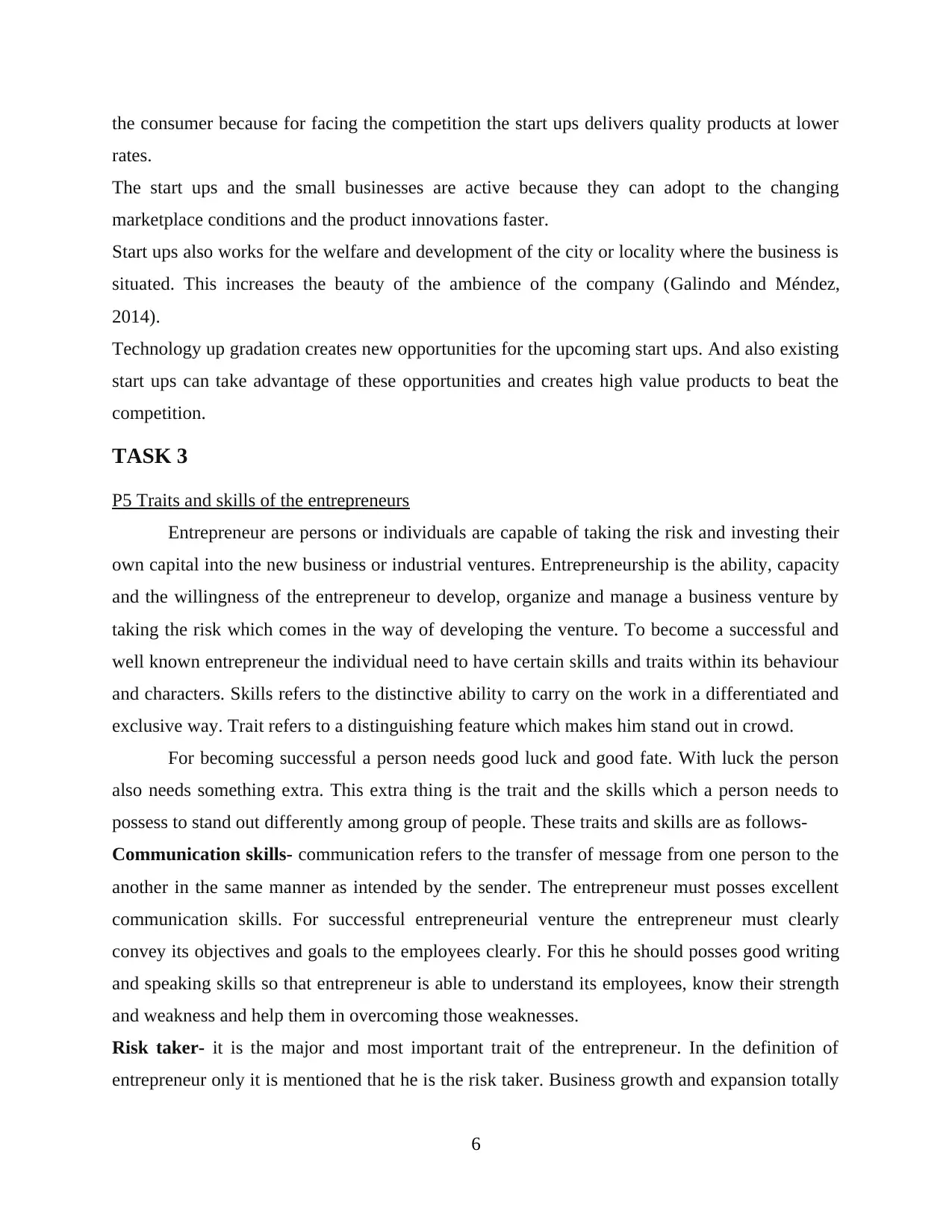
the consumer because for facing the competition the start ups delivers quality products at lower
rates.
The start ups and the small businesses are active because they can adopt to the changing
marketplace conditions and the product innovations faster.
Start ups also works for the welfare and development of the city or locality where the business is
situated. This increases the beauty of the ambience of the company (Galindo and Méndez,
2014).
Technology up gradation creates new opportunities for the upcoming start ups. And also existing
start ups can take advantage of these opportunities and creates high value products to beat the
competition.
TASK 3
P5 Traits and skills of the entrepreneurs
Entrepreneur are persons or individuals are capable of taking the risk and investing their
own capital into the new business or industrial ventures. Entrepreneurship is the ability, capacity
and the willingness of the entrepreneur to develop, organize and manage a business venture by
taking the risk which comes in the way of developing the venture. To become a successful and
well known entrepreneur the individual need to have certain skills and traits within its behaviour
and characters. Skills refers to the distinctive ability to carry on the work in a differentiated and
exclusive way. Trait refers to a distinguishing feature which makes him stand out in crowd.
For becoming successful a person needs good luck and good fate. With luck the person
also needs something extra. This extra thing is the trait and the skills which a person needs to
possess to stand out differently among group of people. These traits and skills are as follows-
Communication skills- communication refers to the transfer of message from one person to the
another in the same manner as intended by the sender. The entrepreneur must posses excellent
communication skills. For successful entrepreneurial venture the entrepreneur must clearly
convey its objectives and goals to the employees clearly. For this he should posses good writing
and speaking skills so that entrepreneur is able to understand its employees, know their strength
and weakness and help them in overcoming those weaknesses.
Risk taker- it is the major and most important trait of the entrepreneur. In the definition of
entrepreneur only it is mentioned that he is the risk taker. Business growth and expansion totally
6
rates.
The start ups and the small businesses are active because they can adopt to the changing
marketplace conditions and the product innovations faster.
Start ups also works for the welfare and development of the city or locality where the business is
situated. This increases the beauty of the ambience of the company (Galindo and Méndez,
2014).
Technology up gradation creates new opportunities for the upcoming start ups. And also existing
start ups can take advantage of these opportunities and creates high value products to beat the
competition.
TASK 3
P5 Traits and skills of the entrepreneurs
Entrepreneur are persons or individuals are capable of taking the risk and investing their
own capital into the new business or industrial ventures. Entrepreneurship is the ability, capacity
and the willingness of the entrepreneur to develop, organize and manage a business venture by
taking the risk which comes in the way of developing the venture. To become a successful and
well known entrepreneur the individual need to have certain skills and traits within its behaviour
and characters. Skills refers to the distinctive ability to carry on the work in a differentiated and
exclusive way. Trait refers to a distinguishing feature which makes him stand out in crowd.
For becoming successful a person needs good luck and good fate. With luck the person
also needs something extra. This extra thing is the trait and the skills which a person needs to
possess to stand out differently among group of people. These traits and skills are as follows-
Communication skills- communication refers to the transfer of message from one person to the
another in the same manner as intended by the sender. The entrepreneur must posses excellent
communication skills. For successful entrepreneurial venture the entrepreneur must clearly
convey its objectives and goals to the employees clearly. For this he should posses good writing
and speaking skills so that entrepreneur is able to understand its employees, know their strength
and weakness and help them in overcoming those weaknesses.
Risk taker- it is the major and most important trait of the entrepreneur. In the definition of
entrepreneur only it is mentioned that he is the risk taker. Business growth and expansion totally
6
⊘ This is a preview!⊘
Do you want full access?
Subscribe today to unlock all pages.

Trusted by 1+ million students worldwide
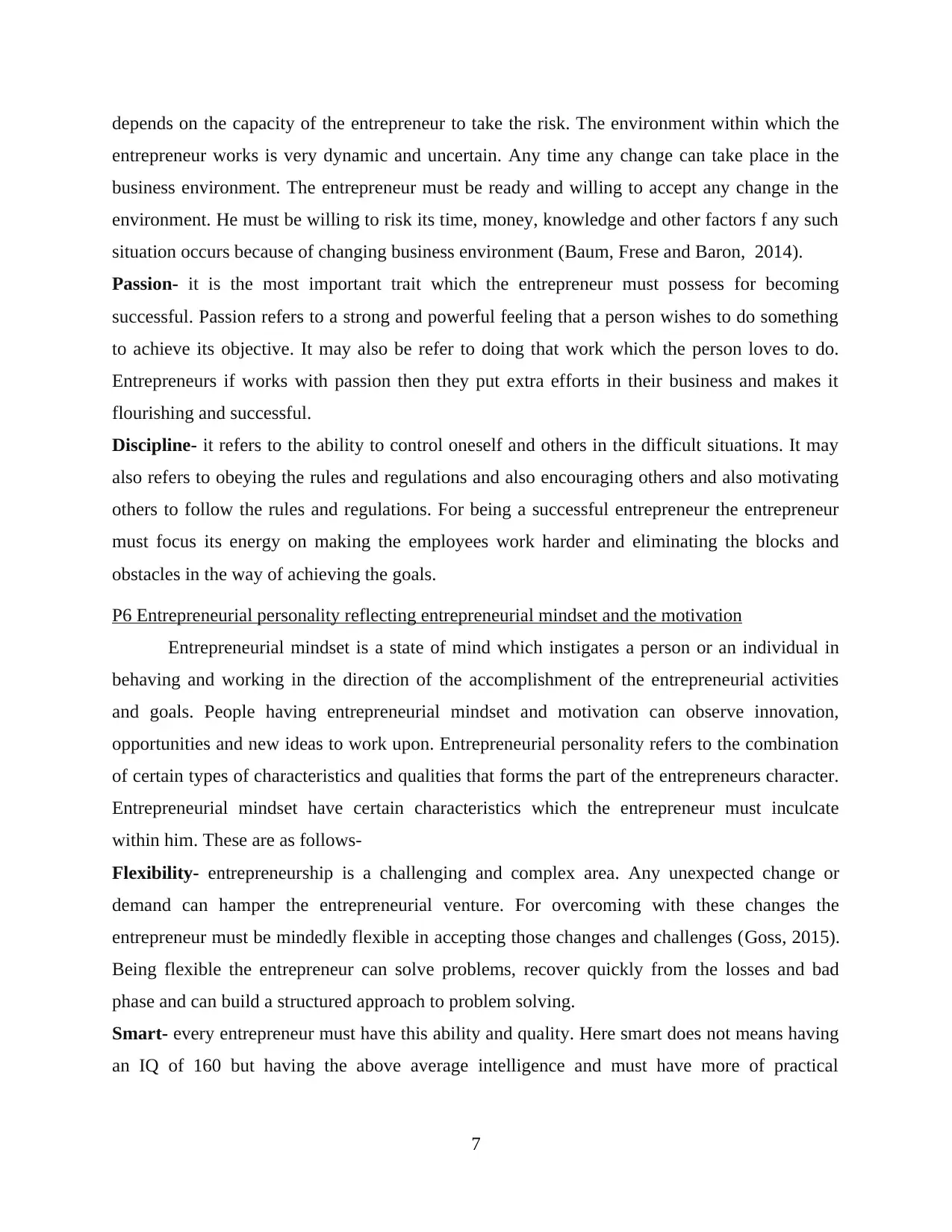
depends on the capacity of the entrepreneur to take the risk. The environment within which the
entrepreneur works is very dynamic and uncertain. Any time any change can take place in the
business environment. The entrepreneur must be ready and willing to accept any change in the
environment. He must be willing to risk its time, money, knowledge and other factors f any such
situation occurs because of changing business environment (Baum, Frese and Baron, 2014).
Passion- it is the most important trait which the entrepreneur must possess for becoming
successful. Passion refers to a strong and powerful feeling that a person wishes to do something
to achieve its objective. It may also be refer to doing that work which the person loves to do.
Entrepreneurs if works with passion then they put extra efforts in their business and makes it
flourishing and successful.
Discipline- it refers to the ability to control oneself and others in the difficult situations. It may
also refers to obeying the rules and regulations and also encouraging others and also motivating
others to follow the rules and regulations. For being a successful entrepreneur the entrepreneur
must focus its energy on making the employees work harder and eliminating the blocks and
obstacles in the way of achieving the goals.
P6 Entrepreneurial personality reflecting entrepreneurial mindset and the motivation
Entrepreneurial mindset is a state of mind which instigates a person or an individual in
behaving and working in the direction of the accomplishment of the entrepreneurial activities
and goals. People having entrepreneurial mindset and motivation can observe innovation,
opportunities and new ideas to work upon. Entrepreneurial personality refers to the combination
of certain types of characteristics and qualities that forms the part of the entrepreneurs character.
Entrepreneurial mindset have certain characteristics which the entrepreneur must inculcate
within him. These are as follows-
Flexibility- entrepreneurship is a challenging and complex area. Any unexpected change or
demand can hamper the entrepreneurial venture. For overcoming with these changes the
entrepreneur must be mindedly flexible in accepting those changes and challenges (Goss, 2015).
Being flexible the entrepreneur can solve problems, recover quickly from the losses and bad
phase and can build a structured approach to problem solving.
Smart- every entrepreneur must have this ability and quality. Here smart does not means having
an IQ of 160 but having the above average intelligence and must have more of practical
7
entrepreneur works is very dynamic and uncertain. Any time any change can take place in the
business environment. The entrepreneur must be ready and willing to accept any change in the
environment. He must be willing to risk its time, money, knowledge and other factors f any such
situation occurs because of changing business environment (Baum, Frese and Baron, 2014).
Passion- it is the most important trait which the entrepreneur must possess for becoming
successful. Passion refers to a strong and powerful feeling that a person wishes to do something
to achieve its objective. It may also be refer to doing that work which the person loves to do.
Entrepreneurs if works with passion then they put extra efforts in their business and makes it
flourishing and successful.
Discipline- it refers to the ability to control oneself and others in the difficult situations. It may
also refers to obeying the rules and regulations and also encouraging others and also motivating
others to follow the rules and regulations. For being a successful entrepreneur the entrepreneur
must focus its energy on making the employees work harder and eliminating the blocks and
obstacles in the way of achieving the goals.
P6 Entrepreneurial personality reflecting entrepreneurial mindset and the motivation
Entrepreneurial mindset is a state of mind which instigates a person or an individual in
behaving and working in the direction of the accomplishment of the entrepreneurial activities
and goals. People having entrepreneurial mindset and motivation can observe innovation,
opportunities and new ideas to work upon. Entrepreneurial personality refers to the combination
of certain types of characteristics and qualities that forms the part of the entrepreneurs character.
Entrepreneurial mindset have certain characteristics which the entrepreneur must inculcate
within him. These are as follows-
Flexibility- entrepreneurship is a challenging and complex area. Any unexpected change or
demand can hamper the entrepreneurial venture. For overcoming with these changes the
entrepreneur must be mindedly flexible in accepting those changes and challenges (Goss, 2015).
Being flexible the entrepreneur can solve problems, recover quickly from the losses and bad
phase and can build a structured approach to problem solving.
Smart- every entrepreneur must have this ability and quality. Here smart does not means having
an IQ of 160 but having the above average intelligence and must have more of practical
7
Paraphrase This Document
Need a fresh take? Get an instant paraphrase of this document with our AI Paraphraser

knowledge rather than the bookish knowledge. With this the entrepreneurs must have reasonable
emotional intelligence also.
Commitment- it refers to the willingness to give the time and energy to someone or something
that the person believes in doing. Commitment helps the entrepreneurs in keep going and allows
the entrepreneur to come out of any dilemma. Even if the entrepreneurs are rejected then also
they should draw lessons and learnings from these rejections and with that it should prevent it
from damaging the self esteem and self respect of the entrepreneurs (Chell and Karataş-Özkan,
eds., 2014).
Optimism- it means the ability of a person to look at a situation in a positive way and being able
to understand and analyse the situation and formulating a plan of action to reach to a positive
outcome. By being optimistic about any situation means the entrepreneur is going to explore the
situation to find solutions to the problems. Whenever a problem arises the entrepreneur takes it
positively as a situation from which he will learn something.
TASK 4
P7 Analysis of experience and background on the entrepreneurship
Entrepreneurship refers to the process of identifying and exploiting the possibility of
developing new goods and services to achieve the objective of the profit making. Yes, it is true
that the background and the experience hinders or fosters the growth of the entrepreneur and the
entrepreneurship process. It is affected by factors such as family background, experience and
other entrepreneurs also.
Entrepreneurs are not born, they are made. In making an entrepreneur his background and
experience affects very much. Entrepreneur's background tends to influence the entrepreneurial
behaviour and their workings. If the person does not have a background of entrepreneurship then
it will be difficult for the entrepreneur to develop the entrepreneurial spirit within them. This is
so because social values are nurtured in a person since time of his childhood. So the values
learned by the entrepreneurs are based on their learnings from their family. Actually, there is a
link between entrepreneurial characteristics and background of the individuals. Sometimes
background of some individuals becomes either the factor of hindrance or it fosters the growth
of the entrepreneur (Bennett, 2014). Also it is sometimes difficult for a person to develop the
certain skills and traits after a certain period of time.
8
emotional intelligence also.
Commitment- it refers to the willingness to give the time and energy to someone or something
that the person believes in doing. Commitment helps the entrepreneurs in keep going and allows
the entrepreneur to come out of any dilemma. Even if the entrepreneurs are rejected then also
they should draw lessons and learnings from these rejections and with that it should prevent it
from damaging the self esteem and self respect of the entrepreneurs (Chell and Karataş-Özkan,
eds., 2014).
Optimism- it means the ability of a person to look at a situation in a positive way and being able
to understand and analyse the situation and formulating a plan of action to reach to a positive
outcome. By being optimistic about any situation means the entrepreneur is going to explore the
situation to find solutions to the problems. Whenever a problem arises the entrepreneur takes it
positively as a situation from which he will learn something.
TASK 4
P7 Analysis of experience and background on the entrepreneurship
Entrepreneurship refers to the process of identifying and exploiting the possibility of
developing new goods and services to achieve the objective of the profit making. Yes, it is true
that the background and the experience hinders or fosters the growth of the entrepreneur and the
entrepreneurship process. It is affected by factors such as family background, experience and
other entrepreneurs also.
Entrepreneurs are not born, they are made. In making an entrepreneur his background and
experience affects very much. Entrepreneur's background tends to influence the entrepreneurial
behaviour and their workings. If the person does not have a background of entrepreneurship then
it will be difficult for the entrepreneur to develop the entrepreneurial spirit within them. This is
so because social values are nurtured in a person since time of his childhood. So the values
learned by the entrepreneurs are based on their learnings from their family. Actually, there is a
link between entrepreneurial characteristics and background of the individuals. Sometimes
background of some individuals becomes either the factor of hindrance or it fosters the growth
of the entrepreneur (Bennett, 2014). Also it is sometimes difficult for a person to develop the
certain skills and traits after a certain period of time.
8
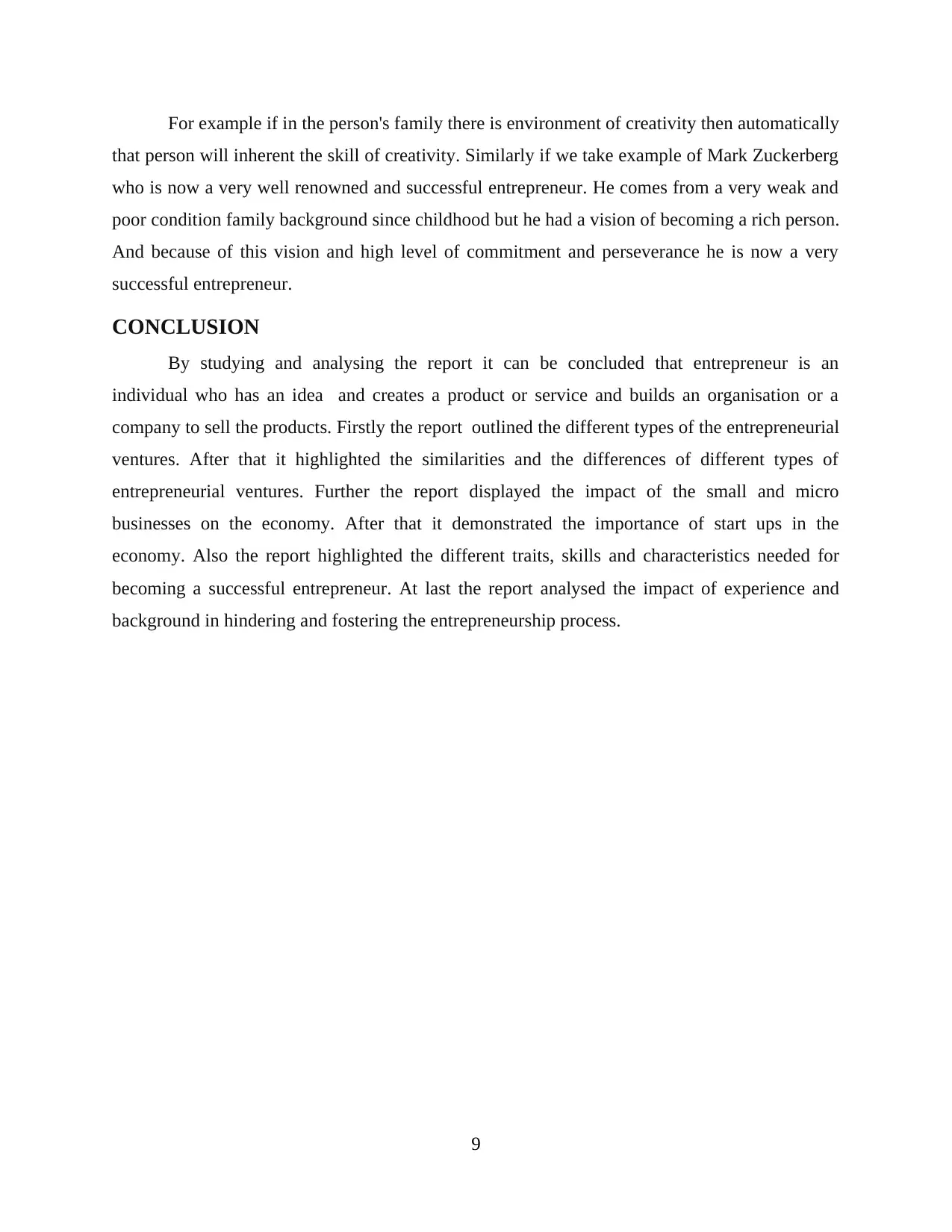
For example if in the person's family there is environment of creativity then automatically
that person will inherent the skill of creativity. Similarly if we take example of Mark Zuckerberg
who is now a very well renowned and successful entrepreneur. He comes from a very weak and
poor condition family background since childhood but he had a vision of becoming a rich person.
And because of this vision and high level of commitment and perseverance he is now a very
successful entrepreneur.
CONCLUSION
By studying and analysing the report it can be concluded that entrepreneur is an
individual who has an idea and creates a product or service and builds an organisation or a
company to sell the products. Firstly the report outlined the different types of the entrepreneurial
ventures. After that it highlighted the similarities and the differences of different types of
entrepreneurial ventures. Further the report displayed the impact of the small and micro
businesses on the economy. After that it demonstrated the importance of start ups in the
economy. Also the report highlighted the different traits, skills and characteristics needed for
becoming a successful entrepreneur. At last the report analysed the impact of experience and
background in hindering and fostering the entrepreneurship process.
9
that person will inherent the skill of creativity. Similarly if we take example of Mark Zuckerberg
who is now a very well renowned and successful entrepreneur. He comes from a very weak and
poor condition family background since childhood but he had a vision of becoming a rich person.
And because of this vision and high level of commitment and perseverance he is now a very
successful entrepreneur.
CONCLUSION
By studying and analysing the report it can be concluded that entrepreneur is an
individual who has an idea and creates a product or service and builds an organisation or a
company to sell the products. Firstly the report outlined the different types of the entrepreneurial
ventures. After that it highlighted the similarities and the differences of different types of
entrepreneurial ventures. Further the report displayed the impact of the small and micro
businesses on the economy. After that it demonstrated the importance of start ups in the
economy. Also the report highlighted the different traits, skills and characteristics needed for
becoming a successful entrepreneur. At last the report analysed the impact of experience and
background in hindering and fostering the entrepreneurship process.
9
⊘ This is a preview!⊘
Do you want full access?
Subscribe today to unlock all pages.

Trusted by 1+ million students worldwide
1 out of 13
Related Documents
Your All-in-One AI-Powered Toolkit for Academic Success.
+13062052269
info@desklib.com
Available 24*7 on WhatsApp / Email
![[object Object]](/_next/static/media/star-bottom.7253800d.svg)
Unlock your academic potential
Copyright © 2020–2026 A2Z Services. All Rights Reserved. Developed and managed by ZUCOL.





